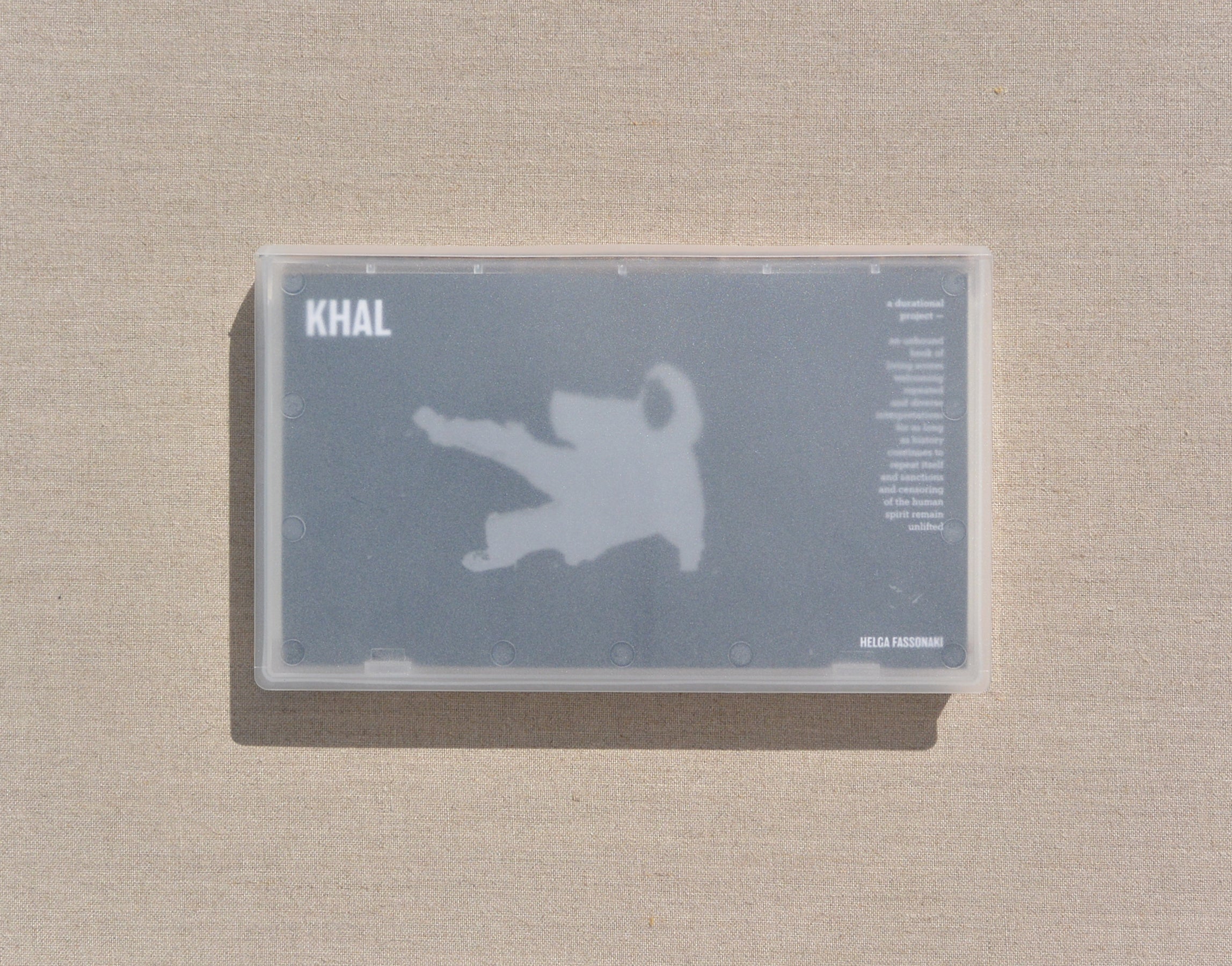Helga Fassonaki: Khal
Drawing Room Records + Sming Sming Books
April 2020, English, 7.75 x 4.75 inches, 110 loose-leaf pages, two cassette tapes
Edition of 150
Design: Sming Sming Books
Co-published with Drawing Room Records!
Khal was supported, in part, by a Foundation for Contemporary Arts Emergency Grant.
After the establishment of the Islamic Republic of Iran in 1979, Ayatollah Khomeini condemned all forms of music, other than classical and traditional Persian music as being corrupted and influenced by Western culture, and therefore, forbidden. During this time, Khomeini forbade women from singing solo in public because of "the seductive quality of the female voice"—a law which is still in effect today.
Helga Fassonaki began the Khal project in 2014 while living in Tabriz, Iran. Because the use of her voice as a woman in public performance was restricted, Fassonaki sent compositions in the form of sculptural scores to sixteen female artists and musicians living in different cities and parts of the world. The scores were interpreted and performed publicly by these artists in lieu of Fassonaki’s ability to do so.
These living scores were then passed on to additional female artists and musicians, creating an open book of socio-spatial exchange. As the series unfolds from one event to another, a cumulative composition of voices and actions will continue to grow until the law inhibiting artistic expression ceases to exist. This ongoing exchange and peaceful protest refers to the derogatory use of the Farsi word “khal,” coined to describe the passage of Iranian pop music in the form of homemade mixtapes. Once pop music was no longer being produced or sold in Iran after the Islamic Revolution, the Los Angeles Persian community sent mixtapes to residents in Iran so they could listen to their own country’s pop stars. Fassonaki remembers partaking in this movement when she was a kid residing in Los Angeles. The steady flow of cassettes soon became state-approved in Iran, an example that gentle poetic actions can push through governing law.
The original recipients of Fassonaki’s scores include: Marcia Bassett (Zaïmph), Christina Carter, Angel Chirnside, Kali. Z. Fasteau, Chiara Giovando, Jenny Gräf, Kelly Jayne Jones, Kathleen Kim, Heather Leigh, Rachael Melanson (Ro Sen), Shana Palmer, Ashley Paul, Purple Pilgrims, Matana Roberts, Rachel Shearer, and Gabie Strong.
Additional participating artists include: Yasi Alipour, Mira Billotte (White Magic), Jo Burzynska (Stanier Black-Five), Zahra Killeen Chance, Ella Chau Yin Chi (French Concession), Nazanin Daneshvar, Suki Dewey, Beth Ducklingmonster, Helen Greenfield (Mela), Hermione Johnson, Sarah Kelleher (Misfit Mod), Jessika Kenney, Pauline Lay and Ang Frances Wilson, Elizabeth Mary Maw, Maryam Bagheri Nesami, Tina Pihema (Piece War), Fariba Safai, Julia Santoli, Laura Sofia, Joan Sullivan, Gemma Syme (Instant Fantasy), twelve anonymous artists in Tabriz, Iran, and more as the series continues.
Iterations of Khal were exhibited at Glasshouse, Los Angeles Contemporary Archive, Disjecta, the Auricle Sonic Arts Gallery, the 2015 Audacious Festival of Sonic Arts, Audio Foundation, Viewfinder, and Nga Taonga Sound & Vision.
Helga Fassonaki is a multi-disciplinary artist and curator of Iranian-Azeri decent, born and currently residing in Los Angeles. Her work crosses fields of nature, sound, video, performance, and installation. She performs solo as yek koo, a project begun in 2006, exploring the body as a vehicle for the movement of sound and duo in Métal Rouge (with Andrew Scott), formed in 2005. In 2017, Fassonaki founded untune, a socio-curatorial project with a series of programming dedicated to the term “Social“. Her work solo and in collaboration, has been presented at MOCA (Los Angeles), LACA (Los Angeles), Whitney Museum of American Art (as part of the Whitney Biennial 2014), LACE galleries (Los Angeles), Human Resources (Los Angeles), Audio Foundation (Auckland), Blue Oyster gallery (Dunedin), Box Gallery (Los Angeles), Disjecta (Portland), Zebulon (Los Angeles), Café Oto (London), Vox Populi (Philadelphia) among many others. Fassonaki is currently working on an ongoing series called 100’ Circles, which attempts to address the changes/transitions/cycles (historic, social, natural, environmental) of specific land masses around the world. So far she has created a 100’ Circle in Vanier Park, Vancouver; Joshua Tree, California; and the Berkshires, Western Massachusetts.




